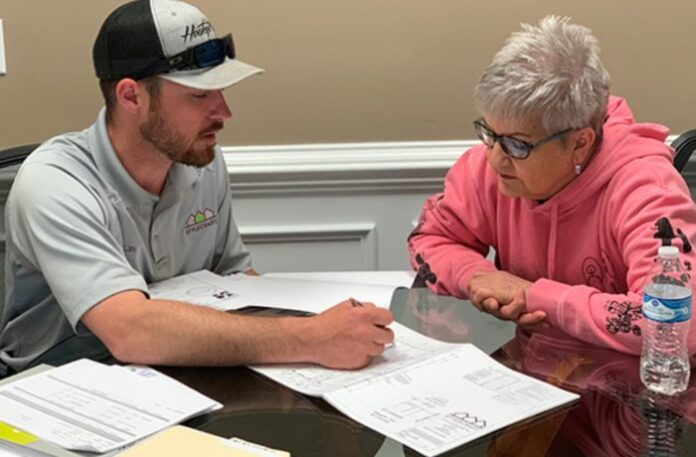Every great project manager has certain qualities in common. Since there are tons of things that can go wrong on a job site, you must prepare and keep these tips in mind.
Seeing a construction project from start to finish is a challenge. Architects, contractors, and construction managers get a real sense of accomplishment from completing a task on time and budget.
Large construction sites are beehives of activity as hundreds of people go about their tasks. Construction managers are responsible for keeping everyone working safely and efficiently by providing the best equipment, performing routine safety checks, and providing key occupation-specific training to keep workers safe on the job. Online OSHA 10 training is a powerful tool available to employers via providers like 360 Training to provide staff with the skills they need to mitigate worksite hazards before they. The following are a few tips to help construction managers get the job done.
1. Plan Things in Advance

When planning a job, there are many parts to the whole that need to all come together at the right time; this doesn’t happen by accident; it takes deliberate planning. Keeping track of everything in your head is impossible, which is where companies like Sitepod come into play by providing an easy to use software that helps bring everything together. You will start the planning process well before the project begins. You may need to update your plan as the work project unfolds. Planning is what takes an idea and turns it into reality. Your planning makes collaboration between different trades possible.
2. Map Out the Pre-Construction Area

Proper planning includes site surveys and research into the local environment, which includes weather patterns, local zoning issues, and knowing what kinds of subcontractors are available, among other considerations. Construction sites are unpredictable. Weather, including rain and windstorms, can impact the construction terrain. Your pre-construction mapping will give you an idea about the environment you can expect. Use historical data to learn more about the site. Your project can be adjusted based on the construction area.
3. Humility Is Essential

You will work with professionals who have years of experience. Listen to and accept reasonable suggestions from those who have been working in the field for decades. It is OK to learn from that experience; there is a reason you hired these pros in the first place, take advantage of their experience. Not only will you learn from them but it also boosts morale. There is nothing more demoralizing than being marginalized and ignored. Listening to the pros you hired doesn’t mean you do whatever they say, but on small requests, it won’t hurt to follow their lead. Give firm and clear direction when needed. Your example will encourage people to work together, harmoniously.
4. Communication Is Vital

Plans become confused when there is no communication. Communicating on a large site can be challenging as you will deal with people from different economic, cultural, and educational backgrounds. You need to be understanding and communicate with them based on who they are.
Mistakes and disagreements will happen between your team members if you do not collaborate. A construction site is no place for errors. Mistakes can lead to injury and loss of expensive materials.
Also, you don’t want to micromanage. Allow the foremen to do the job you’ve hired them to do. Taking charge of a job that you’ve hired others to do can be demoralizing; it also undermines the people you’ve put in charge with the workers you’ve placed under them. When a leader is less respected the quicker the people under them start to question the direction laid out by them.
5. Be a Real Leader and People Will Follow

You cannot construct the building by yourself. You need to assign the right people to the right jobs. Respect a person’s experience and skill level. Don’t have senior staff carrying out menial jobs. Being a good leader means keeping your eyes and ears open throughout the entire project. Listening to good advice from the people you’ve hired builds loyalty within the workforce which makes everybody work harder to achieve your goals.
6. Get Better at Time Management

You need to learn how to prioritize. Managing your time means no procrastinating, organizing assignments, and completing projects on time. Set goals and see them through to the end. Also, trust the people working under you to do the job that you hired them to do. Taking a trowel out of the hands of a bricklayer and doing it yourself is not a good usage of your time, for instance. Spend your time making sure the entire job has proper materials to do their jobs and let the foremen sweat the small stuff.
7. Understand The Cost of Materials and Labor

Going over budget is not acceptable; doing so is a quick way to harm your reputation in the industry. In contrast, coming in under or on budget or even under is a great way to further your career. Ask yourself how many jobs would you hire out to people known to spend more money than they say it is going to cost? Not many.
You are responsible for understanding the cost of construction. Be informed about how much materials, labor, and other aspects of the project will cost; this will give you valuable insight that will make you a good construction manager.
8. Read All Contracts

Do not wait until a problem arises before you read the contract. Knowing what arrangements say in advance minimizes conflicts and arguments. Knowing what each party is legally obligated to provide or how to get out of a contract is vital. Don’t get surprised on the job site and lose a couple of weeks of construction time because you need to find a new electrician because you didn’t understand your obligations to the first one you hired. To make your life easier, you can turn to contract management software. GatekeeperHQ offers contract management solutions that help managers, such as yourself, deal with the vast amounts of contract metadata. By transforming your company data into easy-to-understand visuals, you can make fully-informed decisions without difficulty.
9. Become a Skilled Negotiator

It will surprise you with the amount of negotiating you will do. You will need to convince vendors, contractors, subcontractors, and employees that your way of doing things and your decision is the best. A good negotiator gets what they want while making other people think it was their idea.
It is difficult to oversee a team of hundreds of people on a construction site. However, if you set goals, plan well, are respectful of others, read contracts, and have a good picture of what your project entails, you will be successful.









